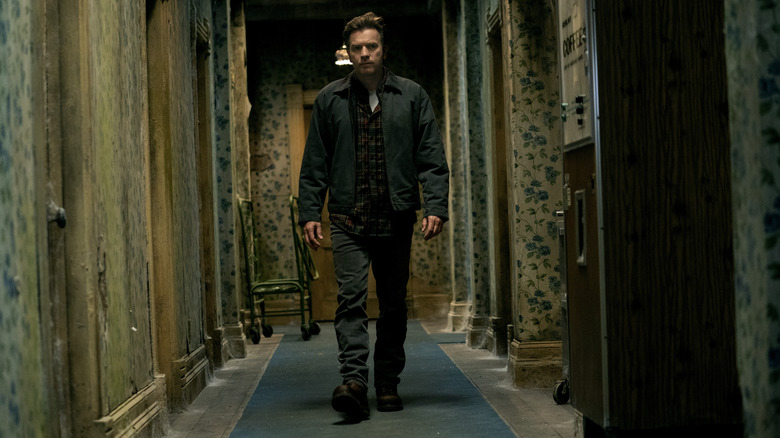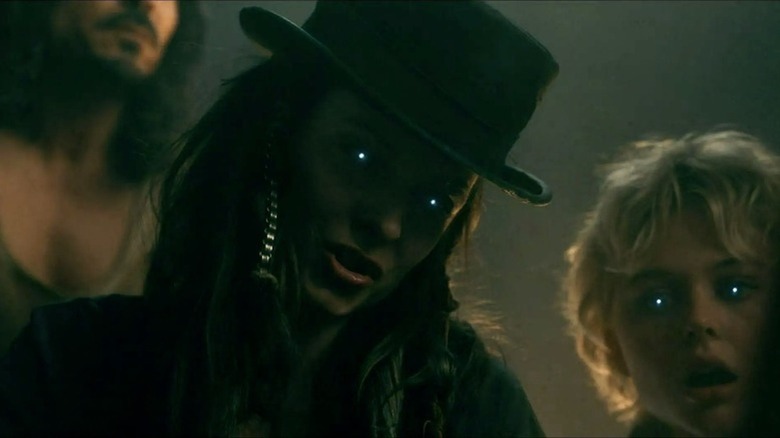The Real Reason Stephen King Wrote The Shining Sequel Doctor Sleep
Death has always been on Stephen King's macabre mind, so it's difficult to say whether, at the age of 77, he's more engaged with the subject than usual. The author has stared the Reaper down at least a couple of times in his life, via the stranglehold of addiction earlier in his career and, in 1999, the car accident that left him in a Maine hospital for a month with life-threatening injuries (and gave us the delirious howl that is "Dreamcatcher"). If nothing else, he respects the notion of dying to know he doesn't want to do it, but that he will and there's no guarantee it'll go down peacefully.
When he was interviewed in 2013 while writing "Joyland" for the Hard Case Crime imprint, King was asked if he'd planned for his death as an author — by which his questioner meant had he socked away a finished book or two to be published after he goes a-shufflin'. He hadn't done so intentionally as Agatha Christie did with "Sleeping Murder" and her autobiography. But his prolificness ensured at the time that "The Wind in the Keyhole" and "Doctor Sleep" would, if he dropped dead that very moment, leave his loyal readers with two more novels.
"Doctor Sleep" might've been a fitting swan song for King. The sequel to "The Shining" allowed King to revisit one of his most fascinating characters as an adult, and answer questions he and his fans had pondered for over 30 years. But to hear King tell it, his initial inspiration for writing the book was a fit of pique.
Stephen King wanted to challenge himself with Doctor Sleep
In the aforementioned interview for the Sunday Times, King said he took on "Doctor Sleep" as a way to challenge himself in the eyes of his readers. Per the author:
"I did it because it was such a cheesed-off thing to do. To say you were going back to the book that was really popular and write the sequel. People read it as kids; then as adults they might read the sequel and think, this isn't as good. The challenge is, maybe it can be as good – or different. It gives you something to push up against."
"Doctor Sleep" definitely is different, if only because it's got a good deal more tenderness to it than "The Shining" (particularly the movie adaptation, which King hated). This is because he shared his fans' curiosity about what happened to Danny Torrence as an adult.
The answers weren't pretty. They couldn't be. "I knew that he would be a drunk because his father was a drunk," said King. He continued:
"He is going to be one of those people who says 'I am never going to be like my father.' Then you wake up at 37 or 38 and you're a drunk. Then I thought, what kind of a life does that person like that have? He'll do a bunch of low-bottom jobs, he'll get canned, and now, I really want him to be in a hospice worker because he has the shining and he can help people get across as they die. They call him Dr Sleep, and they know to call for him when the cat goes into their room and sits on their bed."
Not everyone is a fan of "Doctor Sleep" (I'm mixed on it myself), but it is at the very least a rigorous work that wrestles with the demons our parents plant deep inside our psyche. It's a pretty good story overall (/Film's Chris Evangelista was a fan of Mike Flanagan's feature adaptation), and that's better than getting thwacked upside the head with a contemptuous sequel like Thomas Harris' "Hannibal." King doesn't always hit the mark, but he respects his readers too much to punish them for wanting to delve deeper into the darkness.

